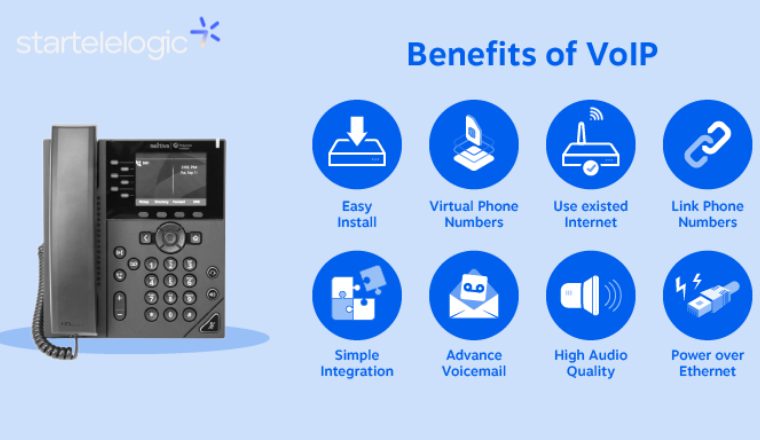Business communication is undergoing a rapid transformation, and Voice over Internet Protocol (VoIP) phone systems are at the forefront of this change. VoIP technology enables businesses to transmit voice calls over the internet, offering a range of benefits over traditional telephone lines, including cost savings, improved flexibility, and advanced features like video conferencing and virtual voicemail.
As remote work becomes more prevalent, seamless communication has become essential for businesses of all sizes. VoIP phone systems offer cutting-edge technology that can enhance productivity, streamline operations, and improve customer service, making them an increasingly indispensable tool for businesses in today’s digital landscape.
Connect Globally with Robust VoIP Solutions
At startelelogic, we are dedicated to providing robust VoIP solutions that enable you to connect with the world seamlessly. Our focus is on delivering exceptional and personalized VoIP services that set you apart in the market. Our strategy is foolproof and based on a thorough analysis of the market’s capabilities, which has led us to conclude that the future lies in digital solutions. Our IP-based communication solutions offer superior customization, reliability, scalability, and voice quality. With our expertise, you can trust that your conversations will leverage the power of Internet telephony, surpassing even the most renowned VoIP business solutions available.

We offer Custom VoIP Solutions
As a distinguished and foremost VoIP Service Provider, startelelogic is deeply committed to delivering exceptional communication solutions that are tailored to meet the unique needs of our esteemed clients. With our extensive knowledge and proficiency in the industry, we offer a broad spectrum of state-of-the-art VoIP services designed to optimize your enterprise’s communication infrastructure. Our comprehensive solutions include advanced call routing, high-quality video conferencing, virtual phone systems, and other cutting-edge technologies. At startelelogic, we are devoted to providing unparalleled levels of service and support to our valued clients, ensuring that their communication requirements are fulfilled with the utmost excellence.
Popular VoIP Phone Service Features
As a leading VoIP service provider, we offer an array of highly sought-after features that can significantly elevate your business communication.
Some of the key features of our service that are in high demand among businesses include:
- Call forwarding: This feature allows you to forward your incoming calls to another number, such as your mobile phone, ensuring you never miss a call.
- Conference calling: With conference calling, you can connect multiple participants on the same call, making it an ideal solution for remote meetings or collaboration sessions.
- Voicemail: Voicemail allows callers to leave a voice message if you are unable to answer their call, ensuring that you can stay informed and up-to-date with your messages.
- Call recording: Call recording is a useful feature that allows you to record important conversations for later review or reference.
- Caller ID: The caller ID displays the name and number of the person calling, allowing you to identify who is calling before answering the call.
- Call waiting: This feature alerts you to an incoming call when you are already on a call, giving you the option to put the current call on hold and take the new call.
- Auto-attendant: An auto-attendant is a virtual assistant that can help you manage your incoming calls by directing them to the appropriate department or extension.
- Virtual phone numbers: With a virtual phone number, you can have a local phone number in another area code, making it easier for customers or clients to reach you.
- Call queuing: Call queuing is a feature that allows you to hold incoming calls in a queue until a representative is available to take the call, ensuring that your customers are never left waiting on hold for too long.
- Custom hold music: Custom hold music can help enhance the customer experience by providing pleasant music or informational messages to keep customers engaged while they wait on hold.
- Call monitoring: Call monitoring allows managers or supervisors to listen in on calls, providing the opportunity for coaching and training to improve call quality and customer service.
- Automatic call distribution (ACD): ACD is a feature that automatically routes incoming calls to the most appropriate agent or department based on pre-set criteria, ensuring that calls are handled efficiently and effectively.
- Multi-level IVR: Multi-level IVR allows you to create complex call menus with multiple options and submenus, providing callers with a more personalized and streamlined experience.
- SIP trunking: SIP trunking allows you to connect your VoIP phone system to the public switched telephone network (PSTN), enabling you to make and receive calls to non-VoIP phone systems.
- Hot desking: This functionality empowers your employees to log in to any connected device and access their messages and calls, providing them with flexibility and mobility.
- Transcriptions: With this feature, you can obtain written records of calls that can be used for training or serve as evidence of call conversations, helping you improve your customer service and compliance.
- Live chat: As a modern and preferred communication method for many customers, live chat allows you to engage with them in real-time and provide instant support, which can improve customer satisfaction and loyalty.
Benefits of Using VoIP Technology
VoIP technology has numerous benefits that make it a preferable choice for businesses and individuals. Its cost-effectiveness saves users money on long-distance calls and eliminates the need for expensive phone lines and equipment. VoIP also offers advanced features like call forwarding, voicemail-to-email, and video conferencing that can enhance productivity and streamline communication processes. Its scalability allows businesses to add new lines or features without additional hardware or wiring, making it an ideal solution for growing companies. With its seamless connectivity, users can make and receive calls from anywhere with an internet connection, making it perfect for remote workers, businesses with multiple locations, or those with a mobile workforce. Overall, VoIP technology provides a reliable, efficient, and cost-effective communication solution that can revolutionize the way we communicate.

Technologies We use
WebRTC (Web Real-Time Communications): WebRTC is an open-source technology that allows web browsers to establish real-time communication channels, including voice and video calls, without the need for plugins or additional software.
Cloud-Based VoIP: Cloud-based VoIP solutions are becoming increasingly popular, as they allow businesses to host their VoIP systems in the cloud, rather than on-premises. This can reduce costs, simplify management, and provide greater scalability and flexibility.
Unified Communications (UC): Unified Communications is a suite of tools and technologies that enable users to communicate and collaborate seamlessly across multiple channels, including voice, video, instant messaging, and email. UC solutions are often integrated with VoIP systems to provide a complete communications platform.
FreeSWITCH: FreeSWITCH is widely used by businesses and organizations around the world for a variety of VoIP applications, including call centers, teleconferencing systems, and voice messaging applications. It’s open-source nature and extensive feature set make it a popular choice for developers looking to build custom VoIP applications.
Kamailio: Kamailio is an open-source SIP server used for building real-time communication applications such as VoIP, instant messaging, and video conferencing. It is designed to run on Linux operating systems and supports a range of VoIP protocols and signaling technologies. Its key features include high scalability and performance, advanced call control and routing capabilities, advanced security features, support for multiple VoIP protocols, and integration with other popular VoIP platforms and applications. Kamailio is widely used by businesses and organizations globally, especially in large-scale deployments. It is a popular choice for service providers due to its robust feature set and high performance, while developers prefer it due to its open-source nature and suitability for building custom VoIP applications.
OpenSIPS:- OpenSIPS is a powerful open-source SIP server that provides a highly scalable and customizable platform for VoIP communications. With its advanced features and modular architecture, OpenSIPS is well-suited for businesses of all sizes, from small startups to large enterprises. It’s robust performance and flexible routing capabilities make it an ideal choice for building complex VoIP systems that can handle high call volumes and provide reliable, secure communications. Whether you’re looking to deploy a simple SIP proxy or a complete VoIP platform, OpenSIPS offers the tools and flexibility you need to build a reliable and scalable solution.
Asterisk:- Asterisk is a powerful and widely-used open-source software platform for VoIP (Voice over Internet Protocol) systems, which allows businesses to create and manage their own communication networks that support voice, video, and messaging. It provides a flexible and scalable solution that can be customized to meet the unique needs of any organization, whether large or small. With Asterisk, users have access to a wide range of features and functionalities, such as call routing, IVR (Interactive Voice Response), conference calling, and more. It is also highly secure and reliable, ensuring that businesses can communicate with confidence. Additionally, Asterisk is cost-effective and easy to use, making it an ideal choice for companies looking to improve their communication systems and enhance overall productivity.
IPPBX:- An IPPBX for VoIP is a technology that allows businesses to manage their communication channels through the Internet. It provides advanced features that enable companies to streamline their communication processes, including call routing, voicemail, and conferencing. An IP PBX is designed specifically for VoIP, meaning that it can integrate with other digital communication tools, such as video conferencing and instant messaging, to create a unified communication experience. Its powerful and versatile features make it an indispensable tool for modern enterprises seeking to enhance their communication capabilities and improve overall efficiency, productivity, and customer service. Additionally, an IPPBX for VoIP can reduce communication costs, improve flexibility, and increase scalability, making it an attractive option for businesses of all sizes.
How to choose a VoIP service provider?
When choosing a VoIP service provider, it’s important to carefully consider your business’s unique needs and requirements. Once you have a clear idea of the features you need, there are several additional factors to keep in mind:
Budget: Cost is always a consideration, but it’s important to strike a balance between affordability and quality. Look for a provider that offers transparent pricing and no hidden fees.
Growth potential: Your business needs will likely change over time, so it’s important to choose a provider that can easily scale up or down as needed.
Customer reviews and feedback: Look for a provider with positive customer reviews and a track record of providing excellent service.
Availability of support: Ensure that your provider offers 24/7 support and has a team of experts available to assist with any issues that may arise.
Documentation: A good VoIP provider should have detailed documentation available online to help you troubleshoot issues or answer any questions you may have.
Network compatibility: Check that your provider’s service is compatible with your existing network infrastructure.
Redundancy: Choose a provider with multiple, redundant data centers to ensure maximum uptime and minimal downtime.
Optional professional services: Look for a provider that offers additional professional services, such as installation or configuration, if you require extra assistance.
Examples of clients in a similar industry: Ask your potential provider for examples of clients in a similar industry to yours to ensure that they have experience meeting the needs of businesses like yours.
By considering these factors, you can choose a VoIP service provider that meets your business’s unique needs and helps you achieve your communication goals.

